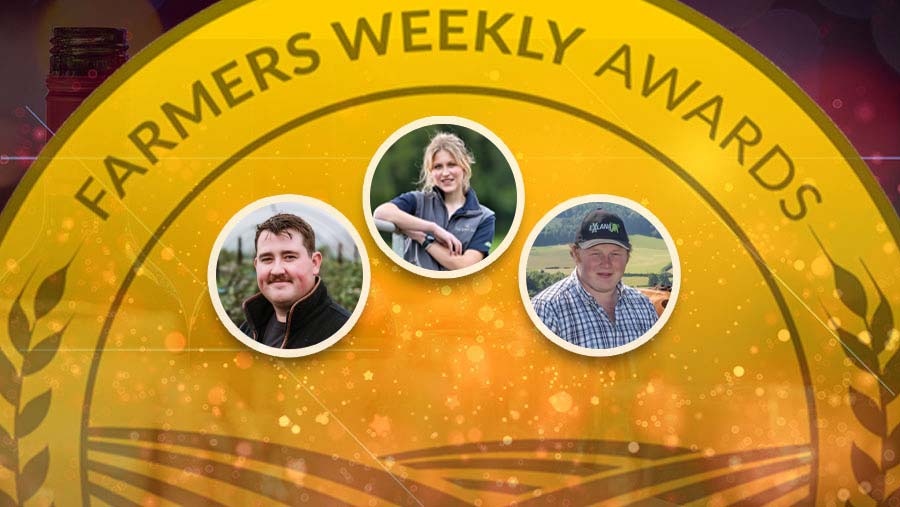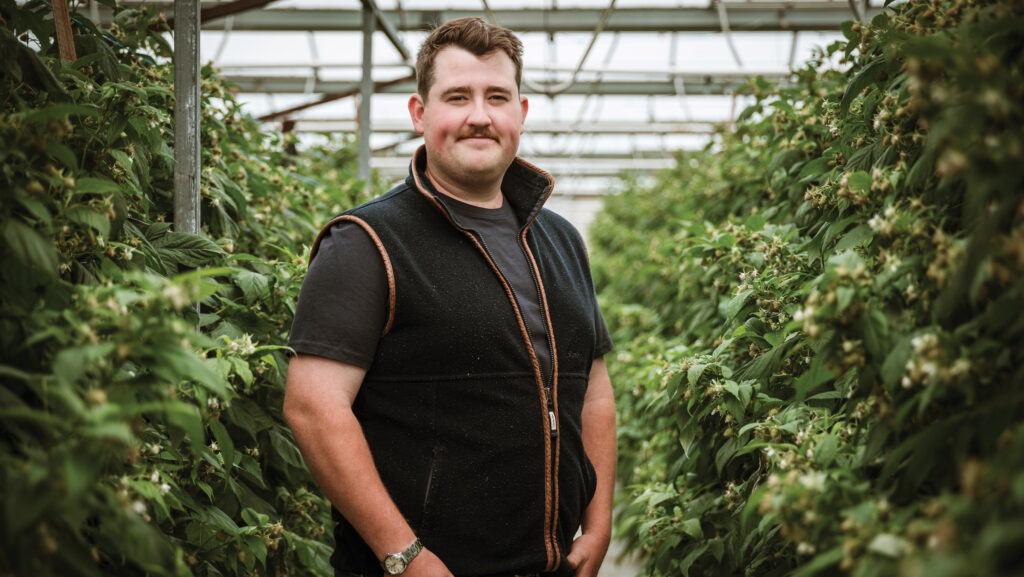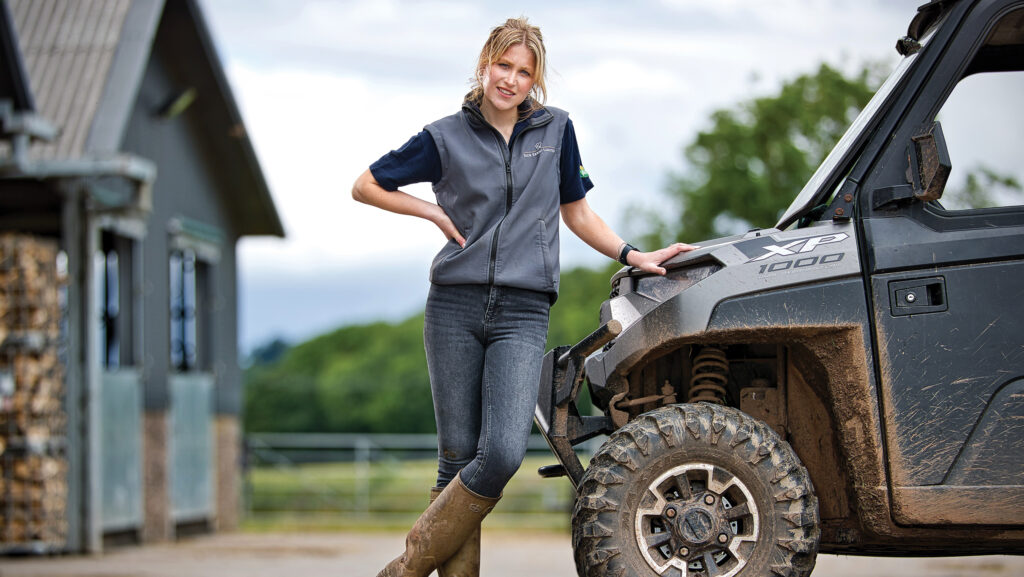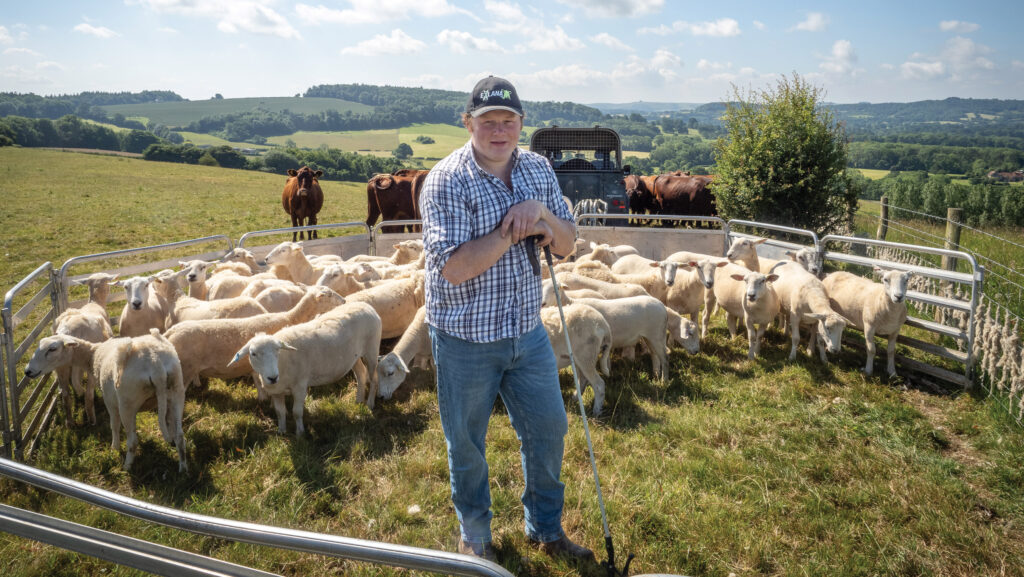FW Awards: Meet the Young Farmer of the Year finalists

Sustainability, creativity and sharp business focus are shared by this year’s exceptional Young Farmer of the Year Award finalists.
See more: Farmers Weekly Awards 2024 – Sheep Farmer of the Year finalists
Finalists
- Archie Evans, Keymer Brook Farm, West Sussex
- Ellie Lovell, Tack Farm, Herefordshire
- Thomas Stinton, Cools Farm, Wiltshire
The judges
- Charles Mayson – The Herefordshire based agricultural compliance specialist is the chairman and founder of CXCS
- Reuben Powell – Welsh broiler farmer Reuben scooped the 2023 Young Farmer of the Year Award for his high welfare, sustainable system
- Matilda Bovingdon – Farmers Weekly news and community reporter, who also farms alongside her family in Berkshire
Archie Evans, Keymer Brook Farm, West Sussex

Archie Evans © MAG/Colin Miller
After completing his degree in agricultural engineering at Harper Adams University, Archie Evans wanted to use his newfound knowledge to start a business alongside his parents on their Chichester fruit farm.
Combining his engineering background and knowledge of fruit farming, he launched Berries on Tap – an on-farm vending machine unit where Archie sells the soft fruit that he and his family produce, providing both a direct route to market and a way of connecting customers with the farm and its seasonal produce.
Archie is passionate about getting the public on farms and close to their food source, and after the success of Berries on Tap, he is developing the vending container into a mobile shop that can be delivered to other farms, plugged in and switched on to give an instant retail space for farmers to sell straight to the public.
The vending machine
The vending machine is sited within walking distance of the glasshouses where the fruit is grown, and it operates autonomously.
Customers can select their product – including strawberries, raspberries, blueberries, blackberries, tayberries and figs – and can check out using the self-serve system, meaning the shop does not normally need to be staffed.
The fruit farm requires five staff, split between fruit picking, packaging and continuously restocking the vending machine – something that has to be done up to 25 times a day, particularly on busier weekends.
While Archie is keen to focus on seasonality and to use the vending machine as a way of informing customers about natural growing seasons, he also stocks a range of locally produced goods from neighbouring farms and businesses, including bread, eggs, cream and meringues – which pair well with the soft fruit.
In the months when his own produce is still ripening, rather than importing fruit, Archie sources produce from other local growers to fill the vending machine. This year, this has included kiwifruit produced in a glasshouse just down the road.
Sustainability
Sustainability and reducing food miles are among the key drivers behind Berries on Tap, and Archie has designed his own plastic-free biodegradable punnets, while also securing funding to power the vending machine with solar panels.
He has removed heating and lighting from the crops to reduce the business’ environmental impact, and also built an irrigation system for the fruit designed to avoid wastage of water and nutrients.
Conventional agrochemicals are an absolute last resort for Archie’s production methods, and he relies heavily on beneficial insect predators within the glasshouses, which has proven a great success over the past two years.
Regenerative horticulture
Keen to make use of waste materials, Archie experimented over the winter with a horticultural regenerative farming system, growing gourmet mushrooms on old strawberry substrate.
This, he hopes, will yield both a saleable mushroom compost, as well as producing a second crop – the mushrooms – for sale.
So far he has successfully produced oyster, king oyster, shitake and enochi mushrooms.
In numbers
- 6 varieties of fruit sold
- 11t of fruit sold last year
- 5 members of staff
- 200 fig plants, a new fruit trial
Farm facts
- Fruit is grown in glasshouses split across a 4ha site
- The farm produces strawberries, raspberries, blueberries, blackberries, tayberries and figs
- Excess fruit is never wasted – Archie has partnered with a local gelato company to make fruit sorbetto which is sold in the vending machine
- Archie is trialing growing gourmet mushrooms on the waste strawberry substrate, with great success so far
The judges liked
- Focus on seasonality, and preserving the fruit’s natural growing cycle
- Solid and thoughtful sustainability credentials at every level – even the packaging
- Creativity and thinking outside the box to create premium products from waste substrate
What the judges say
“Archie has pulled out all the stops when it comes to sustainability and producing food with a minimal environmental impact. He thinks outside the box at every stage – growing mushrooms on a waste by-product is genius.”
Ellie Lovell, Tack Farm, Herefordshire

Ellie Lovell © Richard Stanton
Ellie Lovell was told after completing her studies that she needed to gain life and business experience before returning to the family’s dairy farm in Bromyard, Herefordshire, so that she could add value to the business.
And she has certainly done so.
Taking her father’s advice, Ellie used her knack for numbers and trained as a chartered accountant at a firm in Cheltenham, where she worked for six years.
She made the decision to return to Tack Farm in 2023 in the role of finance director, using her skills to better organise the farm’s finances, monitor costs, and have tighter control over budgeting.
However, before long she found herself drawn out of the office and into the parlour, where her role has evolved to also encompass organising the 15 full-time staff, human resources, health and safety compliance, and the organisation of the herd and running of the parlour.
Herd health
With a “flying herd” of 800 cattle milked three times a day through a 50-point rotary parlour, one of Ellie’s key concerns is herd welfare.
She has achieved Register of Mobility Scorers (RoMS) accreditation and now personally mobility scores each of the cattle in the whole herd every two weeks.
This consistency means she is able to closely monitor other aspects of herd health and identify potential issues as they arise, stepping in to treat issues before they worsen.
Breakfast meetings
Another element of managing herd health has been identifying staff strengths and weaknesses, and providing training and development opportunities for those with particular interests, such as facilitating AI training for employees with an interest in fertility.
One area that Ellie felt needed attention was knowledge of mastitis – both identifying and treating it.
In September last year, the rate of mastitis within the herd was at just under 0.5 cases a cow a year. Ellie identified that the majority of cases occurred during lactation, and that this could be improved with correct training.
From this, the team “breakfast meetings” were born as an opportunity to discuss a range of topics and provide training.
The first two breakfast meetings focused on mastitis, with the farm vet in attendance to train the team on the science, methods and theory, covering prevention and treatment.
These meetings and the training that takes place within them have had a direct impact on herd health, with mastitis rates significantly reduced.
Sustainability
The farm operates on an Arla Morrisons 360 contract, and with the introduction of the points-based sustainability incentive model (SIM) early last year, Ellie has been keen to sharpen the farm’s prospects of scoring well, which translates to a higher milk price paid.
Along with needing to improve “animal robustness”, she recognised that the farm was not scoring as well as it could on soya use, achieving just four out of 11 available points.
After speaking with the farm’s nutritionist, it was decided to go completely soya-free and use rape meal as a replacement. So far, Ellie says this has had little to no impact on cow health and milk yield, but, crucially, has brought their points score high enough to enjoy a premium on the milk price.
The next step is to transition towards 100% renewable energy, which will give the farm an additional five SIM points and add 0.15 euro cents/kg of fat and protein-corrected milk (FPCM).
In numbers
- 486ha of arable
- 800 cows
- 15 staff
- Milking three times a day
Farm facts
- The farm’s arable operations are managed by Ellie’s brother, including 486ha of silage and maize to feed the cattle
- The 800-head dairy herd is milked three times a day through a GEA 50-point rotary parlour
- The dairy cattle produce British Blue and Wagyu calves
The judges liked
- Attention to detail at every level of the business has reaped consistent benefits
- Focus on staff improvement and progression to build better business resilience
- Determination to boost farm sustainability credentials
What the judges say
“Ellie’s impeccable attention to detail and ability to monitor so many elements of the farm and dairy have really paid off, both financially and for herd health. She has nurtured a happy, well informed team, allowing the dairy business to thrive.”
Thomas Stinton, Cools Farm, Wiltshire

Tom Stinton © Kathy Horniblow
Industry newcomer Thomas Stinton joined a share-farming agreement at Cools Farm in East Knoyle, Wiltshire, in 2021, and in the three years since, the 24-year-old has made a major impact on the farm’s systems and route to market.
After attaining a level 3 technical diploma in agriculture at Kingston Maurward College, Thomas was set on pursuing a career within the industry, despite hailing from a non-farming background.
He seized the opportunity to join Cools Farm – although he was put through his paces with a series of interviews and asked to present a business plan, which thoroughly impressed the farm’s owners, Quinton and Maggie.
Livestock
Thomas’ pedigree Red Poll cattle are entirely pasture fed, and currently make up the breed’s largest organic herd in the UK.
As a councillor for the Red Poll Cattle Society, Thomas has been keen to build up the herd’s numbers while focusing on breeding and herd health.
He has more than 200 head of cattle and three bulls, yet started with just 35 Red Polls when he joined the share farming agreement.
Thomas has significantly increased the herd size, and has this year calved 70 cows, finishing the steers for beef.
He has also made changes to his flock of sheep, moving away from North Country Mule crosses and selling his home-bred flock in favour of Exlanas.
Selecting with genetics in mind, Thomas now runs a flock of 200 Exlanas, which he finds to be a lower input breed, which should be easier at lambing time.
Micro dairy
Originating in East Anglia as a cross of a Suffolk Dun dairy cow and a Norfolk Red beef cow, the Red Poll is classed as an “at risk” breed.
Mindful of the breed’s dairy-beef dual purpose, Thomas has created a unique cow-calf “micro dairy”.
After a successful trial period, adapting part of the farmyard into a working parlour, Thomas now milks about 25 of the Red Polls.
Milking is once a day, taking only the surplus milk, while the cow continues to rear her own calf until weaning at eight months.
Once fully established, Thomas hopes the system will let him sell dairy products from the herd in the on-farm shop and to his existing customer base.
Route to market
Before Thomas joined the share-farming agreement, beef from the red polls was sold casually to local outlets.
Identifying an area with room for improvement, Thomas was keen to find a more direct route to market for his organic beef and lamb, and has subsequently built a farm shop as an outlet for his produce.
The self-serve shop operates both from the farm and online for orders, and currently sells about 14 steers and 70 lambs a year.
He has also bought and refurbished a catering trailer, which he takes to local town markets three times a week, building a steady and reliable customer base.
In numbers
- 200 Exlana sheep
- 200 cattle
- 70 red polls calved this year
- 73ha at Cools Farm
Farm facts
- Cools Farm is about 73ha, but Thomas has secured additional organic grazing in the surrounding area
- The majority of beef and lamb is now sold through Thomas’ self-serve farm shop
- Red Poll herd is now the largest organic herd of the breed
The judges liked
- Determination to farm sustainably with great care for the environment and soil health
- Innovative cow-calf dairy brings a new, unique income stream to the farm
- New farm shop complements farming system, bringing consumers direct to the farm
What the judges say
“Thomas has thoroughly impressed with his ability to think outside the box, creating multiple routes to market for his organic produce, while farming in a sustainable, eco-conscious system.”


